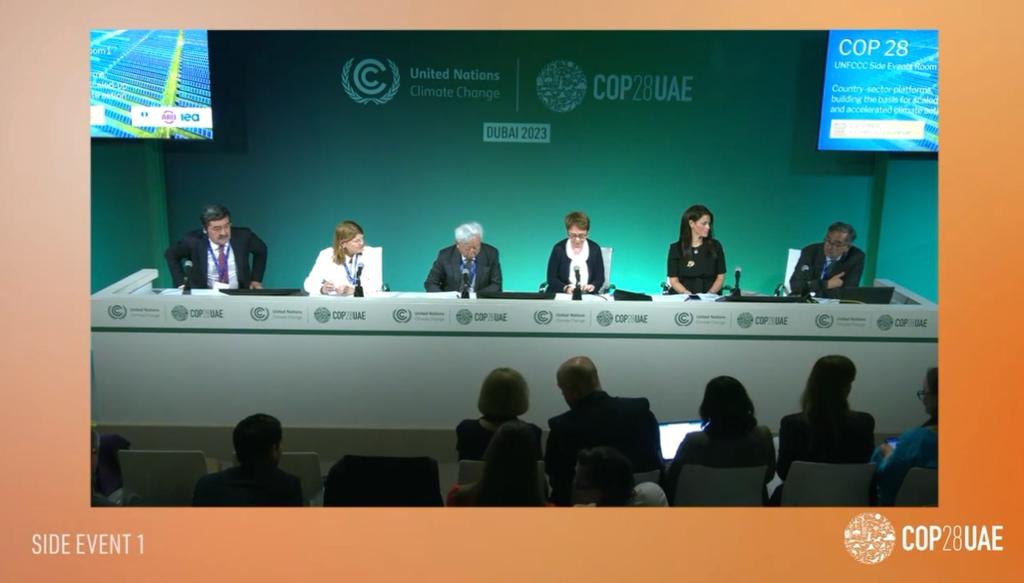
Water Conservation: 7 Simple Ways to Save Water at Home and in Your Business
Water is one of our most precious resources, yet it is often wasted without thought. ...

The presidents of the European Bank for Reconstruction and Development (EBRD), the Asian Infrastructure Investment Bank (AIIB), and the International Renewable Energy Agency (IRENA) lauded Egypt’s NWFE program – the Nexus of Water, Food and Energy – as a model of what country platforms aimed at stimulating climate action should be.
The Minister of the Environment from North Macedonia also expressed her country’s intention to launch a similar platform in light of its efforts to stimulate climate investments.
This came during in a high-level discussion session on laying the foundations for expanding the scope of climate action and accelerating its pace which was held within the framework of the 28th United Nations Climate Change Conference (COP28).
The session discussed the role of country platform methodologies in accelerating the pace of climate action, reducing carbon emissions, and enhancing adaptation and resilience to climate change, as well as the role of multilateral development banks and other relevant parties in supporting this through measures, policies, investments, financing, and capacity building.
During the session, Minister of International Cooperation Rania Mashat reviewed the NWFE program as a model for national platforms aiming to accelerate the pace of climate action, and touched on the efforts that have been made over the course of a year since the launch of the program during Egypt’s presidency of COP27 in Sharm El-Sheikh, in coordination with the relevant authorities, development partners, multilateral development banks, and international coalitions in the field of climate, in order to transform pledges into implementation, making available concessional development financing, technical support, debt swaps, and mixed financing stimulating the private sector, to implement program projects.
Mashat indicated that the country platforms were among the recommendations of the G20 for years to provide development financing and meet the great demand that no one denies at the level of climate financing to implement the energy transition in different countries, but they were not put into practice, explaining that Egypt took responsibility of launching a national platform based on state ownership and leadership of development efforts.
She added that the Ministry of International Cooperation, during Egypt’s presidency of COP27, launched the Sharm El-Sheikh Guidebook for Just Financing which worked, through close cooperation between more than 100 development partners and relevant parties, to develop a clear definition of fair finance and set 12 principles in a way that enhances the role of these country platforms in mobilizing the development financing required for climate action.
Mashat further stressed that the pillars and methodologies of the NWFE program apply the principles of the Sharm El-Sheikh Guidebook for Just Financing, which enhances its ability to mobilize funds and investments from development partners and the private sector, noting that the program includes 3 interconnected pillars in the fields of water, food, and energy. In addition to the NWFE+ program in the sustainable transport pillar.
Mashat pointed out that the results achieved by the NWFE program over the course of a year, and the close cooperation between the government as a policy and initiative maker, multilateral and bilateral development partners, and international institutions, would not have happened had it not been for the program being characterized by three main factors; commitment, clarity, and credibility, by The Egyptian state was and remains determined to move forward to enhance climate action and implement the Nationally Determined Contributions (NDCs) and Egypt’s Climate Change Strategy 2050.
Mashat also stated that in an event that served as a prelude to COP28 in Egypt in November, the Ministry of International Cooperation launched the first follow-up progress report for the NWFE program, in order to reinforce the importance of governance and transparency, which included a presentation of all aspects of work and progress within the program over the course of a year in its various pillars. This reflected the success of the efforts made to begin implementing pledges with multilateral and bilateral development partners.
This event also witnessed the issuance of a joint final statement made in coordination with 20 development partners, international financing institutions and international coalitions in the field of climate action, which includes applause from these institutions for the intensive efforts that Egypt carried out to fulfill its pledges in the climate agenda, especially updating the nationally determined contributions, which contributed to implementing the goals of the national platform of the NWFE program.
اترك تعليقا